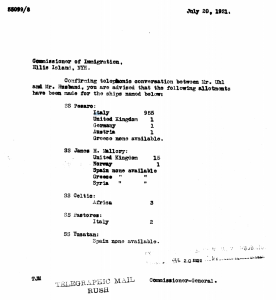ITALY FEELS HARD HIT BY IMMIGRATION BILL: Officials say Johnson’s Proposals Not Only Discriminate, but Also Affect National Income.
ROME, Jam. 5. – The Italian public is much exercised over the possibility that Congressman Johnson’s bill, curtailing immigration into America from Southern and Eastern Europe, will be approved by Congress and go into force at the expiration of the present immigration law on June 30.
The possibility that the Italian emigration to the United States will be cut down from 42,000 to something under 8,000 annually also causes apprehension in official circles here, as any tampering with Italy’s safety valve of emigration is viewed with deep alarm. The Foreign Ministry, however, denies that the Italian Ambassador has been instructed to protest, as was announced by several newspapers here. He has merely been told to keep in close contact with American officials, and to lose no opportunity to present the Italian case to the public in the United States.
The Foreign Ministry makes a moral question of the problem of emigration to America, and objects to what it terms the “discrimination against Italy” embodied in the proposed bill. As Italy sees it, Congressman Johnson’s plan, whether intentionally or unintentionally, hits Italy more severely than any other European country, and therefore it is natural to conclude that it is directed chiefly against Italy.
“If the bill is passed it will publicly brand Italians as ‘undesirable aliens.'” said a high official at the Foreign Ministry, “and it is this aspect of the case which preoccupies us more than the material damage that curtailment of emigration will cause us.”
The same official also said that the work done by Italians on the American railroads, “which are literally strewn with the corpses of Italian workmen.” should, if nothing else, preclude any idea of shutting the Italian out.
In addition to these moral considerations, there are several material ones which give the Italian officials concern. Notable among these is the benefit of remittances which Italian immigrants send home every year, and the curtailment of that part of Italian exports which are consumed chiefly by Italian emigrants. There are sources of national income which, the officials hold, would be cut off should the Johnson bill be approved by Congress.
The subject of the New York Times article is the Immigration Act of 1924, where two percent of the total number of people of each nationality were granted immigration visas from every country except Asian nations. The article outlines how the allotted annual immigration from Italy will be cut from 42,000 to less than 8,000 and that the Italian government was shocked by such a development. The Italian government believed it was discriminatory and because of this, many American publications reasoned that the Italian ambassador was instructed to protest the US government. The Foreign Ministry of Italy believes that the bill is aimed specifically at Italian immigration as the proposed cuts affect Italians much more harshly than any other nationality. They also disagree on the grounds that Italian workers have helped build American infrastructure more than any other nationality and should be compensated for their work through the exemption from the restriction. Lastly, the author outlines how Italy is worried that they will not be able to receive as much money from immigrants as there will be less of them at any given time and thus, less money being sent home. This source was found through ProQuest’s New York Times archival database through a search for Italian immigration restrictions.


This is part of a collection of documents taking count of the exact number of immigrants arriving at Ellis Island based on vessel, departure point, nationality of the immigrants and allotted number of immigrants from each departure point per vessel. The immigrants accounted for came from almost every European country, and even some Middle Eastern countries like Syria. There are letters between the Assistant Commander of Immigration on Ellis Island and the Commissioner-General of Immigration in Washington D.C. about the incoming vessels and confirmation on the number of immigrants from each country. One particular telegram stands out, on page 12, that states the “Hehgali Hellas” will be bringing a large number of passengers that are coming to meet their already settled family and because of this are not within the preferential classes that the government would want immigrating.
